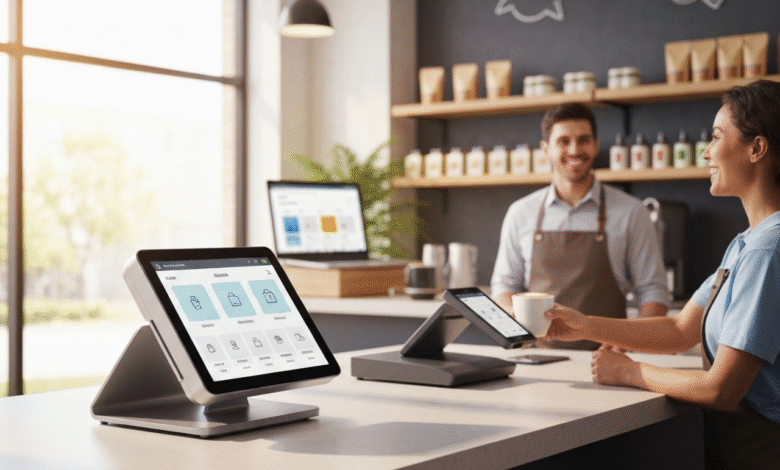Top 5 Small Business POS Systems for 2026

▼ Summary
– A reliable POS system is essential for small businesses in 2026, serving as the central hub for managing sales, inventory, payments, and customer data.
– Square POS is recommended as the best overall system for small businesses due to its simplicity, flexibility, and no monthly fees with transaction-based pricing.
– Zii POS excels in the hospitality sector with features designed for speed, usability, and integration with kitchen displays and delivery platforms.
– POSApt is a versatile, Android-based system ideal for growing businesses, offering affordability, scalability, and compatibility with various devices.
– Shopify POS is the top choice for retailers with both online and physical stores, providing seamless inventory sync and integrated eCommerce tools.
For Australian small business owners, selecting the right Point of Sale (POS) system has become a critical decision that directly impacts daily efficiency and long-term growth. Modern POS solutions do far more than process payments; they integrate inventory, customer data, and sales reporting into a single, streamlined hub. Choosing a system that aligns with your specific business type—whether you operate a bustling café, a retail boutique, or a mobile service—can transform operations, reduce errors, and provide valuable insights into what drives your success.
The Australian small business environment has evolved significantly, with customer expectations higher than ever. People want quick service, multiple payment options, and seamless experiences both online and in-store. At the same time, business owners are focused on controlling costs and improving productivity. A capable POS system addresses these needs by acting as the central command centre for the entire enterprise.
Here’s why a modern POS is indispensable in the current climate:
Speed and precision keep customers happy and prevent costly errors. A reliable system ensures transactions are both fast and accurate. Inventory management becomes effortless, eliminating guesswork and preventing stockouts of popular items. Data-driven decision-making is empowered through detailed reports that highlight sales trends, peak hours, and product performance. Smooth integration connects your physical store, online shop, and delivery services into one cohesive operation. Customer retention tools, such as integrated loyalty programs and SMS receipts, help build lasting relationships.
Think of your POS as the engine of your business. Without a dependable one, you simply won’t get very far.
Leading POS Systems for Australian Small Businesses
1. Square POS – Top All-Rounder for Small Enterprises
Square remains a favourite among Australian small businesses thanks to its simplicity, flexibility, and transparent pricing. It’s an excellent choice for new or growing businesses that need an uncomplicated, yet powerful, system.
Businesses appreciate Square because it grew from a basic card reader into a full business platform. It handles payments, invoicing, staff management, and online sales in one place. You can begin with a free plan that has no monthly fees, paying only a small percentage per transaction, which is ideal for keeping initial costs low.
Notable features include compatibility with Square hardware like Terminal and Stand, free basic software with optional paid upgrades for deeper analytics, and built-in EFTPOS integration that accepts tap, chip, and mobile payments. It also connects effortlessly to a Square Online Store. This system suits cafés, pop-up stores, and service providers perfectly.
Looking ahead, Square continues to advance with AI-powered sales analytics, forecasting tools, and strong connections to accounting platforms like Xero and MYOB. Its local Australian support has also seen significant improvements, making it a reliable partner for business owners.
2. Zii POS – Ideal for Hospitality and Fast-Paced Food Service
Zii POS is an Australian-made system that has earned a strong reputation in the hospitality industry, particularly for cafés, restaurants, and takeaway shops.
What makes Zii stand out is its emphasis on speed and user-friendly design in high-pressure settings. During a busy Saturday brunch rush, every second matters, and Zii’s interface is built for rapid, error-free order entry. It integrates directly with kitchen display screens, printers, and delivery apps like Uber Eats, so orders flow smoothly without confusion or delays.
Key attributes include fully customisable menus and modifiers, integrated EFTPOS through major providers, a real-time Kitchen Display System, an offline mode for uninterrupted service during internet outages, and staff management features including time tracking.
For the year ahead, Zii’s adaptability is a major advantage as the hospitality sector continues to rebound. Its detailed sales reports help owners identify best-selling dishes and areas needing improvement. Developed locally for Australian conditions, Zii POS is a robust choice for any food-focused business.
3. POSApt – Leading Android-Based Solution for Expanding Operations
POSApt offers remarkable versatility for small and medium Australian businesses. Being Android-based, it works across a wide array of affordable devices, from tablets to dedicated terminals, providing a cost-effective route to a full business management system.
This system strikes a balance between advanced functionality and excellent value. It’s more than a payment processor—it’s a unified tool for managing stock, employees, and customer information. Retailers, restaurants, and service businesses all use POSApt to simplify their processes. It also integrates directly with your EFTPOS terminal, so payments are recorded automatically.
Highlights include full Android compatibility, cloud-based reporting accessible from anywhere, suitability for retail, hospitality, and service industries, integrated inventory and staff management, accounting software integrations, and dependable local support.
In the current market, POSApt stands out for its scalability and affordability. It can begin with a single terminal and expand across multiple locations as your business grows. It’s also ideal for businesses wanting to connect in-store sales, online orders, QR code purchases, and EFTPOS through one unified system.
4. Abacus POS – Superior Choice for Multi-Site Operations
Abacus POS is another Australian-developed system excelling in multi-location settings, such as restaurant groups, hotel chains, and franchises.
Businesses choose Abacus for its powerful yet flexible design. It works beautifully for restaurants, bars, and cafés, but also supports retail environments. A single dashboard controls all locations, which is perfect for businesses that are scaling or franchising.
Notable features encompass advanced reporting and analytics, built-in loyalty and marketing tools, centralised menu management across all sites, real-time cloud synchronisation, and integrations with Xero, Deputy, and Tyro EFTPOS.
Recently, Abacus has incorporated more automation and AI, offering forecasts for busy times, automated restocking alerts, and customer engagement recommendations based on buying behaviour. For larger or rapidly growing companies, Abacus delivers scalability without sacrificing ease of use.
5. Shopify POS – Premier Option for Retailers with Online Stores
If your business sells both in a physical store and online, Shopify POS is an outstanding choice. It unifies both sales channels, so stock levels, sales data, and customer profiles are always synchronised.
Shopify POS belongs to the broader Shopify ecosystem, which means eCommerce, payments, and point of sale are all managed together. It’s a natural fit for retail stores that want to sell online and in-person without complication.
Key features include real-time inventory syncing between online and physical stores, built-in gift card, loyalty, and discount functions, detailed analytics and staff permission settings, compatibility with numerous payment gateways, and support for barcode scanners, receipt printers, and tablets.
Shopify remains a global eCommerce leader, and its POS system has matured to meet contemporary retailer demands. With AI-generated product recommendations and enhanced reporting dashboards, it’s among the most intelligent retail systems available today for businesses blending physical and digital sales.
Selecting the Best POS System for Your Business
Every small business has unique requirements. A system that works for a busy restaurant may not suit a clothing boutique or a mobile beauty therapist. Keep the following points in mind when making your choice:
Business Model: Fast order entry and kitchen integration are vital for hospitality. Retailers need robust inventory tracking and barcode scanning. Service businesses may require booking and scheduling functions.
Budget Considerations: Some systems have no monthly fee but charge more per transaction, while others use a subscription model. Calculate the total cost of ownership—value matters more than just the lowest upfront price.
Integration Capabilities: Ensure your POS can connect to your EFTPOS terminal, accounting software, and online store. Disconnected systems create unnecessary complications and manual work.
Scalability: Your business will evolve. You might hire more employees, launch another location, or increase online sales. Pick a POS that can expand with you, like POSApt or Square.
Customer Support: Local support is essential. If a technical problem arises, you don’t want to wait hours for help because your provider is in a different time zone.
The Importance of EFTPOS Integration
In Australia, integrating your POS with your EFTPOS terminal is essential. When these systems work together, you minimise transaction mistakes, accelerate checkout times, and simplify account reconciliation. Systems such as POSApt, Zii, and Abacus integrate with major Australian EFTPOS providers like Windcave, Tyro, Zeller, and Smartpay, ensuring payments automatically update in your POS records.
Making the Right Choice
Your POS system influences nearly every part of your business—not only how you accept payments, but how you understand your customers, manage your team, and plan for growth. Australian small business owners now have impressive technology options available. To recap the leading contenders:
Ultimately, a POS system is more than a piece of hardware or software—it’s integral to your business’s daily rhythm. Take the time to select one that fits your operational style, supports your staff, and meets the expectations of your customers.
(Source: ITWire Australia)



